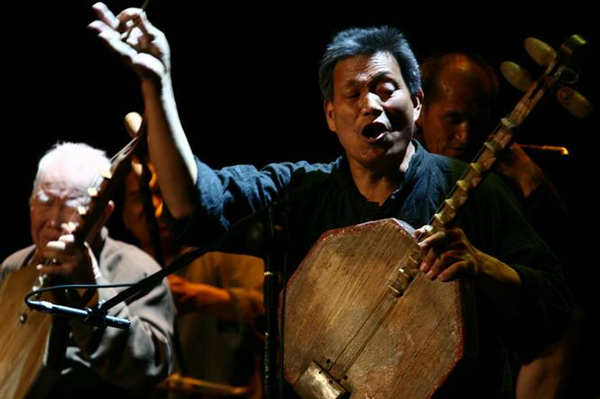| Huayin Laoqiang |
Located in the southeast of Guanzhong basin in Shaanxi province and neighboring Luonan, Huayin borders Tongguan to the east, Huaxian to the west, and Qinling to the south, nearing Dali County across Wei River to the north. It is this unique land that produces an Opera of unique characteristics.
Laoqiang Opera is a kind of model opera. County Annals records that Laoqiang Opera Shadow Play, also called Beating Opera, was prevalent in the Huaxian in the Qing Dynasty for ten years (1736-1745). So far, Lao Opera is primarily popular in Shuangquan village, Huayin of Shaanxi Province.
There are two sayings about the origin of Laoqiang Opera. One is that, compared with other local popular operas, Laoqiang Opera earns its name for being quaint, tragic, calm, vigorous, and bold in music style. The other is that it resulted from its evolution from the narrative singing in Hubei province to Huayin. Therefore, Laoqiang Opera was named by picking the first word “Lao” from “Laohe kou”. It is a kind of opera performed by merely five people with the help of a shadow puppet. The roles consist of Prod player (Shadow Puppet Performer), Vice-Prod player, Leading Singer, Backstage, Banhu, just like the five indispensable roles in Beijing Opera. But these five roles are sung only by one leading singer. Therefore, there is no doubt that it is particularly important for the leading singer to possess a gift. Zhang Ximin is cut out for this role as he is not only versed in singing high-pitched songs but also low-pitched ones. Singing aside, each member is very good at playing prod and various instruments .
Lao Opera, born in the family of Zhang in Huayin, was brilliant in history. In the Ming and Qing dynasties, there were more than a dozen troupes in Huayin frequently performing in neighboring areas, such as Shaanxi, Shanxi, Henan. Zhang Xinmin, Zhang Xinmin, Zhang Junmin and Zhang Shimin are the sons of Zhang Quansheng who is the authentic successor of Huayin Laoqiang Opera. They preserved more than one hundred of the drama books passed down from the Qianlong period in Qing dynasty. Almost all of these books, originating from Tang and Song dynasties, are stories about the Western and Eastern Zhou and the three kingdoms. You could see a section of lyrics written with brushes in vertical lines, some words are marked with circles representing particular attention must be paid to. As most screenplays were spread from Qing dynasty with time-honored history, the color of paper has turned somewhat yellow. Fortunately, the contents in the books have already been engraved in the heart of the performers who only show the books on occasion of major events.
With wooden bench, homemade strings, lyrics passing from generation to generation, Laoqiang Opera, the old cliche yet with unique, heart-shaking old tune, is invited to perform in the grand stage in metropolitan theaters and the CCTV studio hall in its primitive style, gaining widespread recognition.
When it comes to Laoqiang Opera, we must mention Wang Zhengzhong, an old performer also called “white hair”, as he was born with snow-white eyebrow and hair. He is renowned for possessing a superb perception on Laoqiang Opera, but only few local people only know his his real name beside nick name “white hair”. Mr. Wang was not angry with his nick name but proud of being called “white hair”. As a successor of Laoqiang Opera the “White hair”, aged over 70,is quite excited when talking about Laoqiang Opera. When asked to sing face and peach blossom, he would hug banjo and often amaze the audience with his resonant voice, even move people to shed tears when saying “People do not know where to go, the peach blossom smiles the spring breeze as before.”
By inheriting tradition and making bold innovations, Mr.Wang made reforms to enrich Laoqiang Opera. In 1993, Wang was invited to sing Laoqiang Opera in the film Lifetimes Living directed by Zhang Yimou. Along with the film winning festival awards at the international film, Laoqiang with impassioned old tunes began to step into the world stage. Since then, many people both at home and abroad have constantly come to the home of the old performer in Huayin to appreciate the old unique folk art. There are a lot of handwritten music scores, including decades of historical manuscripts. In addition, the old man still writes good calligraphy, and many songs are created by him. He still makes great contributions to collect and publicize traditional music scores. In spite of his advanced age and declining eyesight, he often teaches people Laoqiang Opera free of charge, thus highly commended by local leaders.
 |
|
|
